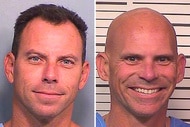Create a free profile to get unlimited access to exclusive videos, breaking news, sweepstakes, and more!
Liam Neeson Responds To Backlash Over Story Of Wanting To Kill A Black Man: ‘I’m Not Racist’
“This was nearly 40 years ago,” Liam Neeson said during an interview with “Good Morning America,” one day after he became the subject of controversy due to his story of wanting to murder a “black bastard” after learning a black man had raped a friend of his.

Amid the aftermath of his surprising admission that he once contemplated murdering a “black bastard” as revenge for his friend’s rape, actor Liam Neeson has defended himself in a new interview, claiming, “I’m not racist.”
While discussing his upcoming revenge-centered film, “Cold Pursuit,” with The Independent, the 66-year-old actor unexpectedly launched into a story of how he once roamed the streets for more than a week, looking for a black man to kill after learning that a close friend of his had been raped by a black man. The story quickly spread on social media, with many claiming that Neeson was now “canceled,” but in a new interview with “Good Morning America” on Tuesday, one day after the original controversial feature was published, the actor denied being a racist.
Speaking with “GMA” host Robin Roberts, Neeson explained that he brought up that time in his life because he was asked by the interviewer how he’d been able to relate to his character’s desire for revenge. What he felt back then was a “primal urge to lash out,” he said.
He expanded on his original story, stating that he deliberately went into “black areas of the city” — a detail that was not included in The Independent’s feature — looking for an excuse to “unleash physical violence.” He did that “four or five times,” he said.
The desire, he said, “really shocked me, this primal urge that I had. It shocked me and it hurt me.”
Neeson went on to say that he sought help and was able to overcome those feelings by confessing his sins to a priest, talking about how he felt with close friends, and by power-walking for two hours every day.
“I’m not racist,” Neeson said. “This was nearly 40 years ago.”
Neeson then referenced his upbringing in Northern Ireland again, and talked about living through “The Troubles,” a years-long violent political conflict that resulted in many deaths.
After Roberts pointed out that Neeson “immediately went to race” when questioning his friend about her rape, and did not necessarily ask “if the person was tall or short, big or small,” Neeson admitted that he did indeed ask about race, but also claimed that he asked about other physical descriptors as well.
When Roberts asked if he would have had the same reaction if his friend had said that it was a white man who raped her, Neeson responded, “Oh, definitely.”
“If she had said an Irish, or a Scot, or a Brit, or a Lithuanian I know I would have felt the same effect,” he said. “I was trying to show honor, stand up for my dear friend in this terrible, medieval fashion. And I’m a fairly intelligent guy, and that’s why it kind of shocked me, when I came down to Earth after having these horrible feelings.”
“Luckily, no violence occurred, ever, thanks be to God,” he said.
Still, when Roberts pressed, asking if he felt that he “actually” would have gone through with such violence if he had had the opportunity, Neeson said, “Yes,” repeatedly.
“That was my feeling. I did want to lash out because my friend was brutally raped and I thought that I was defending her honor,” he said. “And I admit that. It’s a learning curve.”
Neeson concluded the interview by stating that he hoped that his admission would encourage others to “talk, to open up, to talk about these things.”
“We all pretend we’re kind of politically correct. I mean, in this country, it’s the same in my own country too, you sometimes just scratch the surface and you discover this racism and bigotry, and it’s there,” he said.
When Roberts explained that some may still feel hurt by his comments, and by the fact that an innocent black man could have been killed for a crime he did not commit, Neeson responded, “They could have killed me too.”
Roberts gave Neeson credit for being accepting of criticism, and Neeson said again that he was shocked by the “primal hatred” he felt back then. They both agreed that violence is never the answer.
“Violence breeds violence. Bigotry breeds bigotry,” Neeson said near the end of his interview.
[Photo: Getty Images]






















